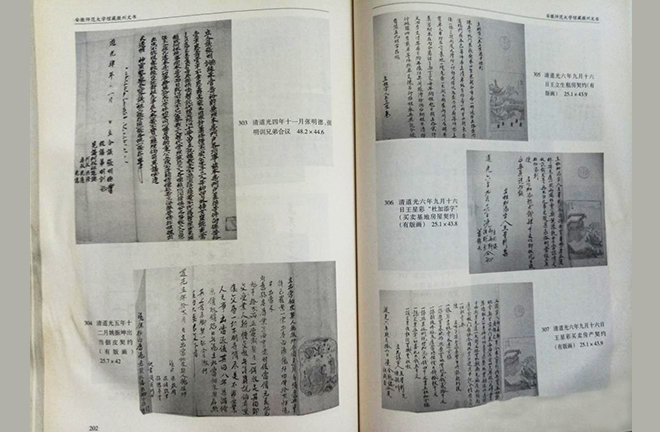Huizhou documents supplement Ming and Qing history

FILE PHOTO: Huizhou documents collected in the library of Anhui Normal University
As an instrumental literature resource of Huizhou studies, the value of Huizhou documents [mainly original records in such forms as contracts, private accounting books, litigation papers, government decrees, pedigrees, and letters], has been continuously shown in the study of Chinese history.
At the 5th Seminar on Huizhou Documents and Chinese History held via video link, scholars exchanged views on how to leverage the value and role of Huizhou documents.
Socio-economic historical reference
Huizhou documents are large in number, long in time span, diverse in types, and rich in content. High-quality Huizhou documents provide unique historical materials for institutional research in such fields as economic history and the history of the legal system during the Ming (1368–1644) and Qing (1644–1911) dynasties. For example, A Petition of Shengyuan in Wuyuan County During the Reign of the Kangxi Emperor presents a student unrest in Wuyuan County in the early Qing Dynasty. Unauthorized penalties inflicted on shengyuan, or students who had obtained official qualifications for the imperial examination, resulted in a joint petition and strike.
Liu Daosheng, a professor from the School of History at Anhui Normal University, by dint of the document, investigated the group of shengyuan in the early Qing and the primary-level administration in Wuyuan County, maintaining that the petition reflects the objective reality that shengyuan in the early Qing continued the enthusiasm of participating in local affairs that had begun in the late Ming. Such an event was a continuation of the “scholastic ethos” in the early Qing since the late Ming, embodying the situation and reality of the Huizhou shengyuan group involving themselves in local affairs in the early Qing era.
Though Huizhou merchants played an important role in the social economy of the Ming and Qing dynasties, what happened to the group in modern times is still insufficiently researched. Jiang Haibo, a researcher from the Sun Yat-sen Memorial Hall in Kobe, Japan, introduced the life story and related documents of the Huizhou merchant Zhang Youshen, a modern leader of overseas Chinese in Osaka whose ancestral home was in Wuyang Township, Shexian County, Huizhou Prefecture. Since the market opening in Osaka in 1868, businessmen from European and American countries, as well as China, have lived and done business in Kawaguchi, Osaka. However, due to the Second World War, the Kawaguchi area met devastating attack, and the textual or pictorial documents and material objects belonging to Chinese merchants were reduced to ashes. In this context, the compilation and publication of Documents of Zhang Youshen’s Relationships, which has been miraculously preserved, exhibits Zhang’s lifetime and career. More importantly, it fills in the gaps in the first-hand historical data on the history of Chinese businessmen in Osaka, while opening up new possibilities in the study of the Sanjiang Chamber of Commerce in Japan and the history of Huizhou merchants.
Huizhou documents also touch on plentiful data concerning social life, offering reference for the study of social and cultural history. Liao Huasheng, a professor from the School of History Culture and Tourism at Jiangxi Normal University, focused on litigation files such as Records of the Lyu Family’s Lawsuits. Such a case was not uncommon in Huizhou in the late Ming era, where in local lawsuits the lower-class gentry used shuotie [ancient judgment documents] or litigation papers to guide public opinion and influence the litigation outcome.
A lens to traditional Chinese society
Over the past 20 years, large batches of Huizhou documents were discovered, compiled, and published, adjusting the context of historical data in the study of Ming and Qing history. Wang Zhenzhong, a professor from the Center for Historical Geographical Studies at Fudan University, noted the core of Huizhou studies—socioeconomic history. Since studies on patriarchal clans, the basic system of household registration and taxation, and land registers touch upon the most central issue of the socio-economic history of the Ming and Qing dynasties, the discovery and use of Huizhou documents have greatly deepened related research. The fruitful Huizhou merchant studies so far, with macro-descriptions almost saturated, have found Huizhou documents as a pole to conduct deeper research. Research on historical geography, social cultural history, and historical anthropology using Huizhou documents is expected to achieve major breakthroughs.
Research based on Huizhou documents is by no means only focusing on the local history of Huizhou, but through Huizhou research to gain an in-depth understanding of traditional Chinese society. Wang suggested seeking an overall understanding of Chinese history through the rich connotations in Huizhou regional research.
Liang Renzhi, a professor from the School of History at Anhui Normal University, echoed that the true value and mission of Huizhou studies should be to reveal the commonalities existing in China’s historical development through the interpretation of Huizhou literature, represented by Huizhou documents, instead of merely exploring the individualities of local social development in each individual document.
